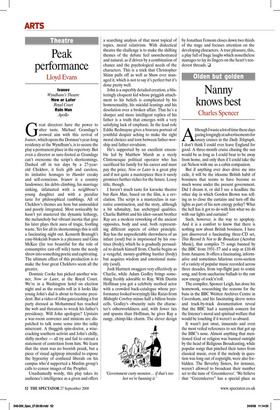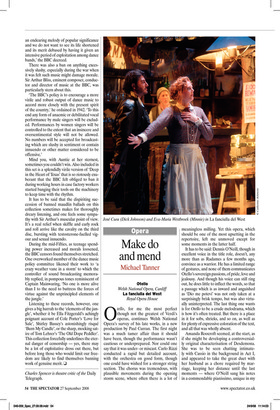Nanny knows best
Charles Spencer
Although I waste a lot of time these days gazing longingly at advertisements for luxury cruises in the Daily Telegraph, I don’t think I could ever leave England for good. A three-month cruise chasing the sun would be as long as I could bear to be away from home, and only then if I could take the cat Nelson with me as a cabin companion.
But if anything ever does drive me into exile, it will be the irksome British habit of bossiness that seems to have become so much worse under the present government. Did I dream it, or did I see a headline the other day in which Gordon Brown was telling us to close the curtains and turn off the lights as part of his new energy policy? What the hell has it got to do with him what we do with our lights and curtains?
Such, however, is the way to apoplexy. And it is a comfort to know that there is nothing new about British bossiness. I have just discovered a fascinating three-CD set, This Record Is Not to Be Broadcast (Acrobat Music), that compiles 75 songs banned by the BBC from 1931–57 and a snip at £10.48 from Amazon. It offers a fascinating, informative and sometimes hilarious cross-section of a variety of popular music recorded across three decades, from top-flight jazz to comic song, and from saccharine ballads to the raw new energy of rock’n’roll.
The compiler, Spencer Leigh, has done his homework, researching the reasons for the bans in the BBC Written Archives Centre in Caversham, and his fascinating sleeve notes and track-by-track documentation reveal that the BBC had a nannyish concern for the listener’s moral and spiritual welfare that would be touching if it weren’t so absurd.
It wasn’t just smut, innuendo and even the most veiled references to sex that got up the BBC’s nose. Almost anything that mentioned God or religion was banned outright by the head of Religious Broadcasting, while popular songs that pinched their tunes from classical music, even if the melody in question was long out of copyright, were also forbidden. The Beverley Sisters, for instance, weren’t allowed to broadcast their number set to the tune of ‘Greensleeves’. ‘We believe that “Greensleeves” has a special place as an endearing melody of popular significance and we do not want to see its life shortened and its merit debased by having it given an intensive period of exploitation among dance bands,’ the BBC decreed.
There was also a ban on anything excessively slushy, especially during the war when it was felt such music might damage morale. Sir Arthur Bliss, eminent composer, conductor and director of music at the BBC, was particularly stern about this.
‘The BBC’s policy is to encourage a more virile and robust output of dance music to accord more closely with the present spirit of the country,’ he ordained in 1942. ‘To this end any form of anaemic or debilitated vocal performance by male singers will be excluded. Performances by women singers will be controlled to the extent that an insincere and oversentimental style will not be allowed. No numbers will be accepted for broadcasting which are slushy in sentiment or contain innuendo or other matter considered to be offensive.’ Mind you, with Auntie at her sternest, sometimes you couldn’t win. Also included in this set is a splendidly virile version of ‘Deep in the Heart of Texas’ that is so riotously exuberant that the BBC felt obliged to ban it during working hours in case factory workers started banging their tools on the machinery to keep time with the rhythm.
It has to be said that the dispiriting succession of banned maudlin ballads on this collection sometimes makes for thoroughly dreary listening, and one feels some sympathy with Sir Arthur’s muscular point of view. It’s a real relief when skiffle and early rock and roll arrive like the cavalry on the third disc, bursting with testosterone-fuelled vigour and sexual innuendo.
During the mid-Fifties, as teenage spending power increased and morals loosened, the BBC censors found themselves stretched. One overworked member of the dance music policy committee likened their work to ‘a crazy weather vane in a storm’ to which the controller of sound broadcasting memorably replied, in pompous tones reminiscent of Captain Mainwaring, ‘No one is more alive than I to the need to buttress the forces of virtue against the unprincipled elements of the jungle.’ Listening to these records, however, one gives a big hurrah to the ‘elements of the jungle’, whether it be Ella Fitzgerald’s achingly poignant account of Cole Porter’s ‘Love for Sale’, Shirley Bassey’s astonishingly risqué ‘Burn My Candle’, or the sharp, mocking satire of Tom Lehrer’s ‘The Old Dope Peddler’. This collection forcefully underlines the eternal danger of censorship — yes, there may be a lot of exploitative dross out there, but before long those who would limit our freedom are likely to find themselves banning work of genuine merit. ❑











































































 Previous page
Previous page